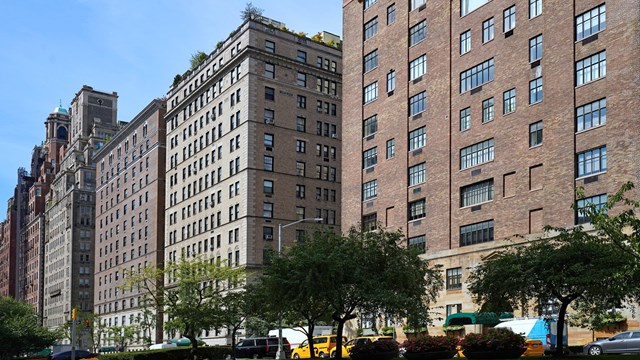If you've just moved to a new co-op or condo, you probably feel as though you've been through a living hell. For several
agonizing months, you and your trusty broker have schlepped from apartment to apartment in an endless, overwhelming search to find the ideal home. You've carefully packed up all of your most cherished belongings in bubble wrap and packing tape. You've hired tall, muscular movers who held your life and assets in their callused hands. You've lived out of boxes, waited a ridiculous amount of time for mechanics, TV repair men and furniture deliveries to arrive. You've cleaned, scrubbed, vacuumed and re-vacuumed more times than you care to admit. You've found furniture that shows off your personality and sets the right mood for your new apartment.
Now, finally, all is in place. You take a deep, cleansing breath as you marvel at the beauty of your new pad. But if you think the worst is over, you're wrong! Did you think the buying process was hard? Let me introduce you to a whole new slew of problems and small catastrophes that can face the new homeowner. Much of my first year as a co-op resident was spent standing on the edge of a huge money-sucking abyss. Teetering back and forth, I wondered whywhen so many of my problems were preventableno one had bothered to advise me before I took the keys and handed over a huge check.
Testing All Systems
Before you fall in love with an apartment, be sure to check all major and minor appliances including the refrigerator, dishwasher, microwave, oven and air conditioner. These come with the apartment, and you will end up owning them whether they work or not. If they don't, it will be your responsibility to fix, throw out or replace them. Don't just ask if they work; insist on trying them. This is your right. If any of these appliances need to be replaced or repaired, your bidding price may be affected. It wasn't until the second washing of dishes that water seeped out from my washer and flooded the floor. Fearful that it would damage not only my apartment, but also the one below me, I immediately called the repairman. Total cost to fix: $260.
Don't be afraid to test the walls, floors and even ceiling for the strength and condition of the plaster and foundations. This never occurred to me when I was apartment hunting. Walls are walls, right? Not true. Many walls have been purposely plastered over, covering up old mistakes, trying to rectify botched up jobs with flimsy sheetrock and other cheap material. This makes picture hanging, wall unit building and any other heavy duty job all the more difficult.
When I moved in, my mother and I made sure everything was spotless before laying down the carpet. As we stood back and admired our efforts, my mother pointed to a pocket in the ceiling. That wasn't there before, was it? she asked. Within the hour the bubble had increased in size. When the super arrived, the pocket was three times as large. As he poked at it with a pressure stick the surrounding area collapsed. Plaster and paint chips went flying in every direction. The room was a disaster area.
Most buildings require you to have home insurance before you sign papers of ownership. This is an invaluable purchase. Make sure you obtain some before you or someone else steps foot inside your apartment. My building was kind enough to take responsibility f ffb or the fallen ceiling and within 48 hours it was repaired. But that's lucky. Most buildings feel that if it happens in your apartment, the problem and the expense are yours. Total fee: in my case none.
Check all outlets to make sure you've got the juice. This sounds like silly advice, but it's crucial information. Take a plug-in clock, radio or nightlight with you so you can test the apartment. I learned this the hard way. I assumed that if the lights worked, so did the outlets. But, as it turned out, the sockets next to the dining room and foyer were dead. I had to bring in an electrician to revive them, an added expense that never should have happened. Total cost: $225.
Halfway through my first winter, significant repair work needed to be done to the central air and water generator. Check how old these systems are and if major work has previously been done. Also, find out what maintenance plans the building has. Other questions to ask include: Is the AC included in the maintenance charge? When was the last maintenance increase? Are there plans for an increase (mine went up four percent)? Are 51 percent of homeowners living in the building? How often does the exterminator come? Has there been a recurring bug problem? This question is especially relevant if you buy an apartment next to, or over, a restaurant.
Meet the Neighbors
About a week after I moved in, my downstairs neighbor slipped a note under my door telling me my shoes made too much noise and that I had a heavy tread. She continued to harass me, leaving incoherent messages on my machine, making spur-of-the-moment appearances at my door and finally writing to the board. I kept a log noting the times she called and the visits made, along with writing to the board, too, just to cover myself. Still, I was informed by the board that it was my responsibility to have 80 percent of my apartment carpeted.
My advice to buyers is to make it a point to meet your neighbors before you select an apartment. You never know if the person adjacent to you is into heavy metal jamming sessions at 1:00 a.m. or sings opera on Sundays at 8:00 a.m. Also introduce yourself to the person below and above you. The best thing to say is: I'm thinking of buying the apartment underneath you. It would really help me out if I could see what it looks like furnished. This way you'll know if your upstairs neighbor has 80 percent of his apartment carpeted, or if huge dogs or rambunctious children are running amok. Take this opportunity to find out if your potential neighbors are satisfied with how the building is run, if the maintenance has increased, if they're happy, etc. Trust me, this will save you more than just money in the long run. Total cost: Wall to wall carpeting in the bedroom$1,200 on sale at ABC Carpet Company.
You should also research who's running the show and whether they're any good at it. Right before Christmas, our superintendent was fired. For several months we went without a super while the management company conducted a search for his replacement. Several people thought this was a bad decision and seemed unhappy with the way the management company was handling things. The board has the power to replace the management company should such a situation arise. Find out if the tenants are happy with the way the building is maintained. Once you have moved into your new home, attend as many board meetings as possible.
Don't Expect Perfection
Could the problems I experienced be the result of bad timing? Perhaps. Am I living in a faulty building? No. Situations arise and things happen. Unfortunately, I feel many of them could have been prevented. You can avoid them if you remember to keep your eyes and ears open, check out every nook and cranny and ask lots and lots of questions.
Surviving your first year as an apartment owner is a demon all its own. The process can be draining and tedious. Looking back on all that has happenedthe falling ceiling, the dead outlets, the psychotic neighbor, the increase in maintenance and the firing of a supe a07 rI still count my blessings and consider myself lucky. The doormen, new super and many of my neighbors are extremely nice and friendly. The board and management company seem to have a strong handle on what's best for the building. Above all, my apartment is large, comfortable and the location is excellent.
Ms. Strauss is a freelance writer living in Manhattan. She has just completed her second film script, Good Intentions, a psychological thriller.






Leave a Comment